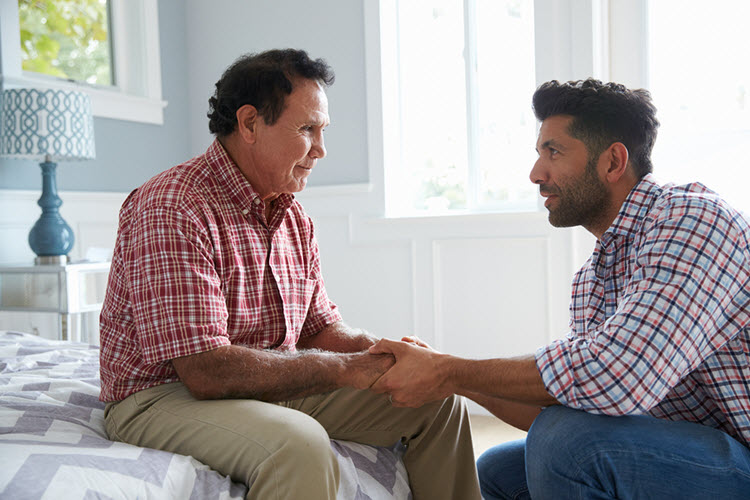Traumatic memories can resurface in a loved one, especially during or after a hospitalization.
When our daughter joined our family six years ago via a special needs international adoption, we knew our lives would change dramatically.
We knew things would be hard.
We knew we’d join the ranks of sleep-deprived parents around the world.
We knew we couldn’t do it alone.
What we didn’t know? I’d have to write a book to cover all the unknowns, but perhaps one of the most challenging aspects of parenting we’ve encountered was also rather unexpected: dealing with PTSD and trauma.
While this story is about the ripple effects of PTSD on caregiving for my young daughter, the lessons apply to caregivers of older adults — as many of them have also lived through a host of traumatic experiences.
My beloved grandfather, who was a POW during the German occupation of his homeland, Norway, suffered many painful flashbacks from that period of his life when he was living with dementia. Though it was never officially diagnosed, he had many of the common symptoms of Lewy Body dementia in particular, which can trigger hallucinations and delusions.
During a short stay in post-acute care, he became extremely agitated and aggressive when confined to the hospital bed, perhaps going back in his mind to those difficult days in Norway.
It’s important that we as caregivers are attuned to the possibility of traumatic memories resurfacing in a loved one, especially during or after a hospitalization, when delirium and medications can derail whatever baseline you had before that admission.
The Complications of Caregiving for Someone with PTSD
Our little girl came to us at nearly three years old. While we don’t know much about those first three years, we know enough to understand why certain things probably trigger her, like the time we went to have bloodwork done and she nearly swiped all the glass vials off the shelves because she was so frightened and agitated that I and two other adults could barely contain her tiny little body. Or the many times she needed a new leg brace and screamed during the casting process, and once nearly bit my finger off when a different orthotist came to the house for the fitting. Or the terrified look she’d get (generally followed by fight, flight, or both) when any kind of medical provider with rubber gloves and a surgical mask approached her.
Because she had medical needs since birth, her extreme anxiety and hypervigilance about anything health-related (even today, she can hear someone say “hospital” or “medicine” or “sick” from a mile away) makes sense. She’s also had 5 surgeries in the last 6 years with us, which has pushed us further down this path of PTSD and trauma caregiving. In fact, most days, her medical needs are fairly simple to manage compared to the emotionally draining intensity of her PTSD and trauma — particularly when she’s having a flashback.
Each surgery and each follow-up doctor’s appointment brought tears, frustration, heartache, and more (both hers and mine). I began to dread even the seemingly benign “check-ups” — which we learned to classify as “talking appointments” so as to minimize anxiety about a potential shot or blood draw. In fact, only until a few months ago, we had to tell any new intake nurse not to take her blood pressure because it’s such a trigger for her. More times than I could count, the nurse would assure her, “Nope, that’s fine, we don’t need to take your blood pressure,” and my sweet girl still had that disbelieving, deer-in-headlights look as she’d back towards the door repeating, “No blood pressure, no blood pressure, no blood pressure.”
What I Learned: 4 Trauma Caregiving Coping Tips
It breaks my heart every time my little girl goes through a clearly painful flashback, or is triggered by something she hears, sees, smells, tastes, or feels. The past 6 years have not been easy, and there is still healing that needs to happen. But I’ve learned so much that has helped me be a better PTSD and trauma caregiver…and I think you’ll find that these tips can apply to caregivers of all ages and in all situations.
- Account for the emotional, mental, and physical exhaustion. Before we adopted, I started working as a freelance writer so I’d have the flexibility I knew I’d need in motherhood. I could take her to doctor’s appointments without having to ask the boss or get someone to cover my shift. What I didn’t realize was how hard it would be to come home from a difficult doctor’s appointment with my daughter, put her down for a nap, then find enough energy and clarity of mind to meet a client deadline or do a phone interview with a source. Just as many people cannot “see” the PTSD, you as the caregiver cannot always “see” the toll your loved one’s hypervigilance takes.
- Seek out compassionate providers. If your loved one struggles with medical PTSD in particular, It’s important to have providers (doctors, nurses, therapists, and more) who are understanding, kind, and willing to work with you to make your loved one feel more at ease. Our dentist, for example, is absolutely wonderful. She goes slow. She doesn’t shout. She doesn’t offer meaningless bribes. She talks through what she’s going to do every single time we have an appointment (we’ve been going there for 4 years). While it takes some work to find them, these providers help lighten the PTSD caregiving load.
- Leave room in the margins. Because medical appointments are so stressful for us, I’ve learned not to overbook: if we can help it, we don’t do back-to-back appointments anymore, or multiple appointments in a week. While you may be tempted to “get this block of appointments out of the way” or double-book to minimize a lot of back-and-forth driving (caregivers do like to be efficient, I know!), it’s a fast track to burnout.
- Find help in the healing process. If you are caring for someone who has experienced trauma (known/unknown) or is showing symptoms of PTSD, get professional help — for your loved one and for you. Secondary traumatic stress (STS) is real, especially if you’re caring for someone with PTSD/trauma triggers 24-7. Don’t try to do it alone: Find a support group, a friend who gets it, a therapist who understands — or all of the above. To help your loved one heal, make sure you’re aware of the healing you may also need from the stress of this type of care.
With thanks to my guest contributor Michelle Seitzer.

Michelle is founder of Caregiving Advice, a resource hub for caregivers of all ages and in all stages.
Disclaimer: The material in this blog is for educational purposes only. It is not intended to replace, nor does it replace, consulting with a physician, lawyer, accountant, financial planner or other qualified professional.

